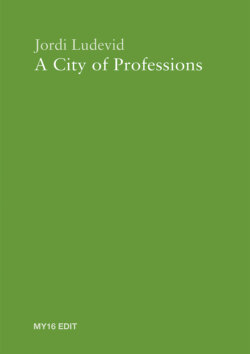Читать книгу A City of Professions - Jordi Ludevid Anglada - Страница 13
На сайте Литреса книга снята с продажи.
ОглавлениеII. The Conangle aqueduct
14th-century heritage element, masonry structure,
a car park, a belvedere.
II. Recovering the Words
Since the end of the 19th century and throughout the 20th, the professional fact has been studied extensively from the perspective of sociology and moral philosophy, from ethics and from the world of law. Herbert Spencer, Max Weber, Émile Durkheim and, more recently, Miguel Herrero y Rodríguez de Miñón, Richard Sennett, Donald Schön, Victoria Camps, Adela Cortina, Javier Gomá and Augusto Hortal are just some examples.
However, from the beginning of the 20th century to the present day, the period in which the professional phenomenon has grown exponentially, there have been practically no reflections that have come from within, and there have been very few congresses or colloquia on the subject. As a result, the professional phenomenon is, in reality, ostensibly unknown, even from within its own institutions.
In order to examine it, we will need to put together a puzzle of elements that are completely scattered, in order to construct a coherent and contemporary overview, which can offer a certain contrast with the academic studies that are currently available, developed mainly from the fields of sociology and moral philosophy. Reflections that will support dissemination and debate in a language that is much closer to the daily reality of professionals and citizens. It is as though sociology and philosophy were never discussed by sociologists and philosophers, but only by others. It is odd.
The interpretation of this institutional silence regarding the professions is by no means self-evident. One should not assume that it is part of a decline, a dearth of proposals, a perplexity or an absence of enthusiasm and conviction that needs to be remedied. On the contrary, it is preferable to believe that the reason is not that institutions have nothing to say, or that they are afraid to say it, but that they are waiting for an opportunity to do so.
And yet, while all this is happening, the key words professional, professionalism, professions, seem to have been lost or overshadowed. These pages are a reflection that posits a possible, though by no means certain, recovery.
Thus, in the face of such a far-reaching challenge, it is inspiring to recall George Steiner3 and Paul Virilio4 in their shared answer to the question of how to regenerate democracy: «recovering the words». And furthermore, according to the urbanist Virilio, «by recovering the city». However, recovering the words is, in this case, a long and uncertain journey, a drawn-out exercise, which of course involves specific challenges.
3 George Steiner (1929-2020), humanist, writer and philosopher of language.
4 Paul Virilio (1932-2018), urban planner and philosopher.
